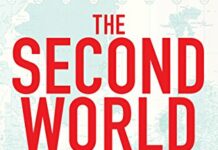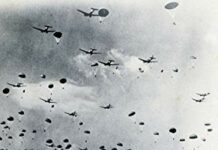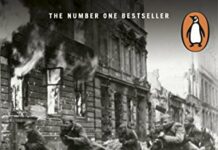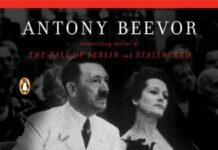
Ebook Info
- Published: 2004
- Number of pages: 464 pages
- Format: PDF
- File Size: 4.24 MB
- Authors: Antony Beevor
Description
“A rich and intriguing story whcih the authors disentangle with great skill.”–Sunday TelegraphFrom Antony Beevor, the internationally bestselling author of D-Day and The Battle of ArnhemIn this brilliant synthesis of social, political, and cultural history, Antony Beevor and Artemis Cooper present a vivid and compelling portrayal of the City of Lights after its liberation. Paris became the diplomatic battleground in the opening stages of the Cold War. Against this volatile political backdrop, every aspect of life is portrayed: scores were settled in a rough and uneven justice, black marketers grew rich on the misery of the population, and a growing number of intellectual luminaries and artists including Hemingway, Beckett, Camus, Sartre, de Beauvoir, Cocteau, and Picassocontributed new ideas and a renewed vitality to this extraordinary moment in time.
User’s Reviews
Editorial Reviews: From the Back Cover When Allied troops fought their way into Paris on August 25, 1944, they were greeted by the wildest scenes of joy Europe had ever witnessed. The following day, over a million people thronged the streets in a delirious atmosphere of freedom to watch General de Gaulle’s triumphant march from the Arc de Triomphe to Notre Dame. There was a black edge to the exuberance, though. Hatreds from the Vichy era led to the settling of scores in a chaos of often wild justice. The period that followed was full of contrast and contradiction: Picasso, a multimillionaire, became the Communist Party’s star recruit; an infatuation with American popular culture thrived amid virulent anti-Americanism; black marketeers grew rich on the misery of the population; literary and social life revived miraculously amid the poverty and dilapidation; Christian Dior revolutionized fashion with the extravagant use of material, and working-class women tore the clothes in outrage from one of his models. Arthur Miller observed of Paris, emotionally scarred by the Occupation, that “the moral, the literary, and the political were the same”. Paris was the focal point in the opening stages of the Cold War, and in the new era of the atom bomb. Existentialists and Communists arguing in cafes sensed that history had entered a decisive phase. At a time when rumor was as powerful as fact, word of plots and counterplots proliferated, and France came to the brink of civil war. Paris After the Liberation is the first work to do justice to this extraordinary period. It is a landmark achievement, a brilliant fusion of politics, literary life, society, theater, fashion, and art woven into a rich and intimate account brimming withrevelation. Acclaimed historians Antony Beevor and Artemis Cooper (the granddaughter of England’s first postwar ambassador to France) have drawn on an astonishing array of sources: unpublished diaries, letters, and photographs; interviews with many of the period’s leading figures; and important material from archives in Paris, the United States, London, and Moscow, whose newly opened state papers have provided a wealth of completely fresh information, much of it startling. Paris After the Liberation brings to life a pivotal moment of world history, suffusing it with wit, anecdote, and brio. It is a brilliant and thoroughly enjoyable work of synthesis, a fitting celebration of the fiftieth anniversary of the liberation of Paris. About the Author Antony Beevor was educated at Winchester and Sandhurst. A regular officer in the 11th Hussars, he served in Germany and England. He has published several novels, and his works of nonfiction include The Spanish Civil War; Crete: The Battle and the Resistance, which won the 1993 Runciman Award; Stalingrad: The Fateful Siege: 1942—1943; and Berlin: The Downfall, 1945. With his wife, Artemis Cooper, he wrote Paris: After the Liberation: 1944—1949. His book Stalingrad was awarded the Samuel Johnson Prize for Non-Fiction, the Wolfson History Prize, and the Hawthornden Prize in 1999.Artemis Cooper’s work includes Cairo in the War 1939–1945 and Writing at the Kitchen Table, the authorized biography of Elizabeth David, both of which are published by Penguin. She has also edited two collections of letters: A Durable Fire: The Letters of Duff and Diana Cooper and Mr. Wu and Mrs. Stitch: The Letters of Evelyn Waugh and Diana Cooper. Her grandfather, Duff Cooper, was the first postwar British ambassador to Paris, and his private diaries and papers provide one of the previously unpublished sources for this book. Artemis Cooper and Anthony Beevor were both appointed Chevalier de l’Ordre des Arts et des Lettres by the French government. They are married and have two children.
Reviews from Amazon users which were colected at the time this book was published on the website:
⭐Books co-authored by husband and wife teams are not uncommon. The results can be harmonious; in this case they are not. Antony Beevor is a distinguished historian and Artemis Cooper is a well-connected writer of considerable experience. Unfortunately, their contributions to this work do not mesh well. It’s as if two separate books were chopped up and their pieces randomly pasted together. This is not to say that the resulting jumble is without interest. On the contrary, there is much absorbing material to be found. The liberation of Paris and the months and years that followed were, after all, a unique and unprecedented time and the authors have managed to pack a lot of fascinating information together. But here’s the problem: they leave it to the reader to find a path through the muddle. Antony Beevor, one must assume, contributed the political and economic sections of the manuscript while Artemis Cooper added the cultural and societal portions. The political parts relay historical events; the cultural lean toward material of a more trifling sort, sometimes merely social events and societal gossip. On the other hand, there are also intriguing portrayals of the friendships, rivalries, and quarrels among famous literary figures such as Jean-Paul Sartre, Simone de Beauvoir, Albert Camus, Arthur Koestler, André Malraux, etc. Less interesting are the often lengthy lists of lesser known intellectuals, many of whom have long since sunk into obscurity.These are accompanied by portrayals of the bitter controversies over their wartime activities: was it resistance, collaboration, or some of each? Artemis Cooper is the granddaughter of Duff Cooper, a politician and aristocrat who was Churchill’s wartime representative to De Gaulle’s Free France and who became ambassador to France in 1944. He was married to the prominent socialite and memoirist Diana Cooper. Artemis’s use of their diaries and letters, adds useful previously unpublished material to the book, though sometimes veering off into quotes taken from letters to figures like Evelyn Waugh and Nancy Mitford with little purpose beyond name dropping. France has been a deeply fractured nation since the days of the 18th century Revolution. Divisions between left and right, republicans and royalists, Catholics and anti-clericals, are integral to its history. The story continues in the period covered in this work. The war divided those sympathetic to the Vichy regime from those who despised it, from collaborators to the underground resistance. The split and anger continued in varied forms at war’s end. The struggle was now between the powerful French Communist party and allied unions favorably disposed to Moscow versus Western oriented Gaullists seeking to restore a democratic republic. While the latter won the day, the crevices that divided the nation then continue. French president after French president has struggled to break the stranglehold hard-left unions hold over the economy, each without success. Emmanuel Macron is continuing the effort with the outcome remaining in doubt.
⭐I have several criticisms, which prevented me from rating it five stars. There were a great number of names of famous (?) persons in all walks, art, literature, politics, military – you get the picture. They breakdown into three categories: people you have never heard of, peoples whose name you vaguely recognize and people you know about (the largest group). The author is British and he assumes everyone knows who he is talking about, this may be true for the English and Europeans but not so for Americans. He should revise the book to give a one or two sentence biography the first time a name is mentioned. The first part of the book describing French politics before the war is incomprehensible; in his defense, I spoke to a good friend from Paris and he says the French cannot figure it out either. The last part of the book is a mad race to bring the book forward after 1949. It is outside the scope of the book and unnecessary. Otherwise – great, I enjoyed it.
⭐This is a good history of the liberation of Paris, the second European capital liberated by the allies. The book’s narrative is strong, and generally stays fairly focused. The final chapter ended up straying a bit from the book’s stated focus, and the book is not as strong on events after 1949 or so, but this is still well written popular history.
⭐This is a interesting joint project from husband-and-wife team Antony Beevor and Artemis Cooper. As one reviewer has noted, this book has somewhat of a split personality — there is a lot of history on the strength of the Communists in postwar France and their subsequent repudiation by most mainstream French as a result of the show trials, but there is also a great deal of kind of celebrity history. The two make for an odd mix and prevent the book from feeling very cohesive, but nonetheless one does learn a lot about Paris (and France) in this era.The authors do want to make the most they can from their access to the papers of Duff Cooper (he was the British Ambassador at the time; Ms. Cooper is his granddaughter), so that also makes for an uneven focus, but shines a light on yet another aspect of the postwar years.Overall — unbalanced focus, but you will learn about the period, and the writing itself is good.
⭐Paris after the liberation tells the history of a dramatic period of the French Republic when the country “should go the psychoanalyst divan” but , instead, try to go ahead with all the problems of the past ( hate to German, defeat. antisemitism, economic crisis, intelectual pride, xenophoby etc ), aggravated by the humiliated years under the Vichy regime. The way this reflects in attitudes of the key persons of the time: De Gaulle, Churchill, Marshall, Truman, Stalin is explored not only in accurate historical texts but with delicious contributions of diaries, letters and memoirs of lost conversations of people that live and work make this book a pleasure to read.
⭐This book is an excellent survey of the forces and individuals at work immediately following World War II that led to the development of Europe in the 21st century. The three tensions of the French people — legacy of Vichy collaboration, diminution of the resistance due to its domination by Communists, the role of France in the near future — are detailed and help any analysis of the path toward the EU. I did skim some of the chapters devoted to the literati but those passages do not detract from the whole.
⭐This is not an account of Parisian life during World War II, but a fascinating account by Antony Beevor and Artemis Cooper of socio-political life in the period immediately after liberation. Paris attracted the great, the good, the famous (such as Ernest Hemingway) and the not-so-good, all of whom played some part in the shaping of post war Paris and France. To someone of my generation (a UK senior citizen now) reading references to Malcolm Muggeridge (a journalist and a UK TV personality, who had been an intelligence officer during the war) came as something of a surprise. The dynamics of political life and struggles in Paris are also detailed. This is not a book to be rushed in the reading.
⭐I enjoy Anthony Beevor ‘s writing – his epics on key WW2 events will stand the test of time . France was/is a complex place after the liberation and with his wife Artemis Cooper he tries to explain and unravel the people and happenings after the withdrawal of the Germans. Maybe not for the general reader , however if interested in the time and the upheaval within the French nation this is for you.
⭐Only just caught up with this book which has been around for ages. I read it just after having read “Normandy” written by Antony Beevor alone, so it fitted in neatly chronologically. As usual with Beevor he laces the straight history with anecdotes & recollections by ordinary people making it immensely readable. I finished it the day I received I & went to bed very late.. Excellent.
⭐Enjoyed this book immensely, hardly able to put it down. Even handed in its approach and is as revealing about Britain during this period as it is about France.
⭐It’s fascinating to see how the European dream was being shaped as long ago as 1947Lots on De Gaulle and the French intellectual LeftAll in all, a splendid book
Keywords
Free Download Paris After the Liberation 1944-1949: Revised Edition in PDF format
Paris After the Liberation 1944-1949: Revised Edition PDF Free Download
Download Paris After the Liberation 1944-1949: Revised Edition 2004 PDF Free
Paris After the Liberation 1944-1949: Revised Edition 2004 PDF Free Download
Download Paris After the Liberation 1944-1949: Revised Edition PDF
Free Download Ebook Paris After the Liberation 1944-1949: Revised Edition





